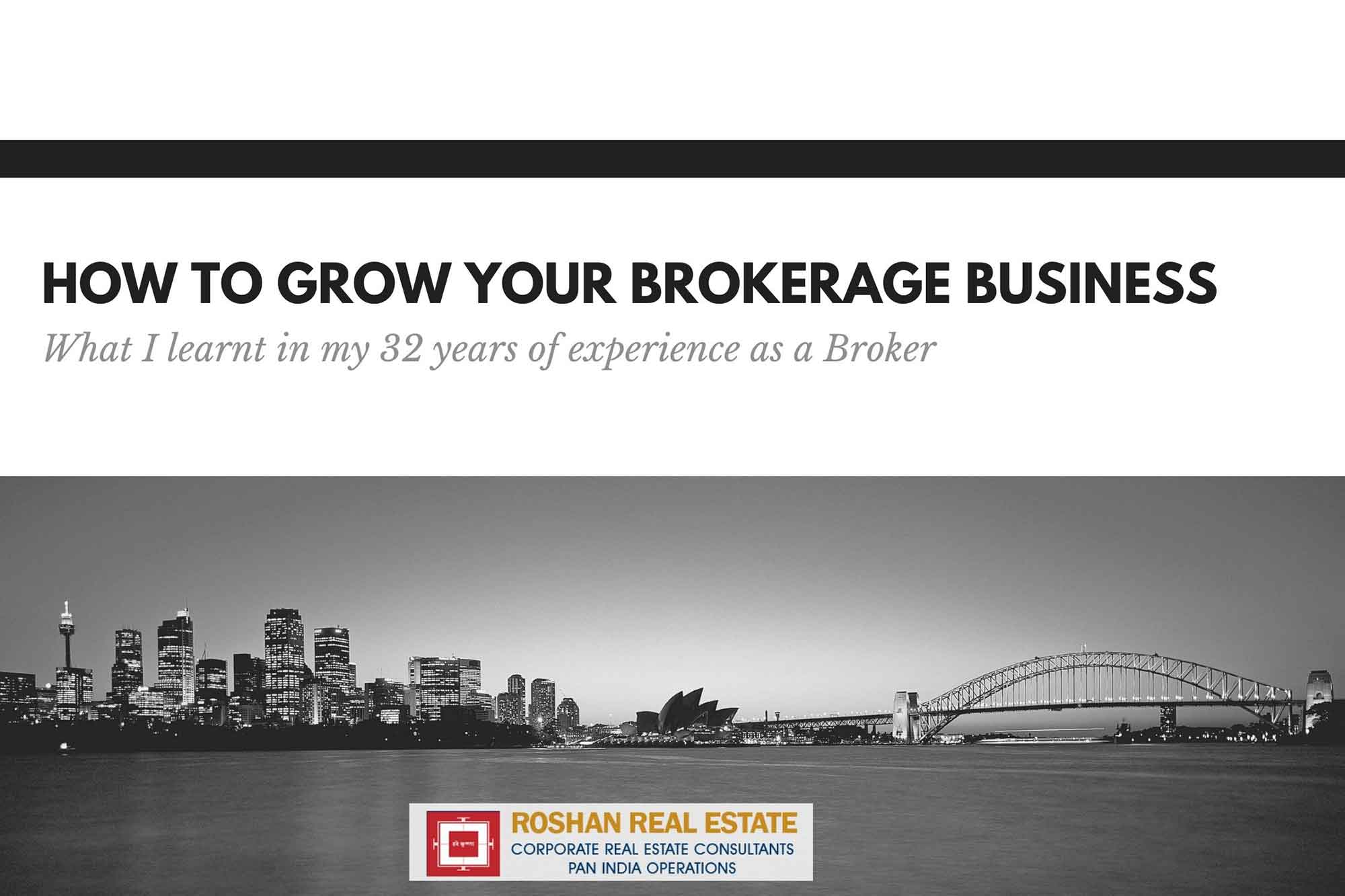Hi!
First of all let me take the opportunity to thank all my broker friends, colleagues and some of you who have worked with me as employees or as associates, who sent me their good wishes on Teacher’s Day, the 5th of September, 2020. I was truly amazed and bewildered by the no. of messages which came in.
I also thought of thanking all those, who sent me messages, in my own way by suggesting a few points which sometimes new or even old brokers forget. Since, I am unable to send you my messages separately; I am using my Blog as the medium of sharing this. And I am sure this will be helpful to all those who look at this effort in a positive manner.
Mistakes are inevitable for new real estate agents who are just starting to grasp the intricacies of the business processes involved in the real estate market. Mistakes are the stepping stones to realize and unleash your maximum potential.
Newly minted realtors might feel like they’re ready to take on the market, but there are some things that only experience can teach. Experience and learning by doing can be fabulous teachers and the knowledge gained through making and correcting mistakes is invaluable. However, when it comes to business, knowing what the common mistakes are and how to avoid them is far better than finding out for yourself – and far less costly. These are all essential in boosting our career forward and to increase our productivity. Here are a few quick suggestions to new as well as settled brokers, a few things I have learnt in my 32 years of experience as a Broker, I am sharing with the brokerage fraternity.
I am also prone to making mistakes, in case I have missed out a few points, do enlighten me; it will also help me perform better.
- Don’t be a Broker by compulsion but become a broker by choice: Working as a real estate agent offers a great deal of variety. With different clients and different properties, you won’t be doing the same thing every day. You also get to be your own boss, meet and work with lots of people, and enjoy the satisfaction of helping them through one of life’s major milestones. But for all of this to happen to you need to love your work. You can’t become a good broker unless you love real estate, neither by obligation/ financial restraints nor not by choice.
- Never Underestimate the amount of time and effort needed to put in before generating a stable income: Good things take time. Though it’s likely that you’re eager to make a name for yourself in the real estate industry, you need to be reasonable in your expectations of how long it will take to launch your career. It could take months to make your first sale as a real estate agent, and it can take you up to two years to begin building a comfortable living from your business.
- Ethics and transparency: Ethics and transparency is something that has been lacking in our broking fraternity, for this simple reason, this profession remains in the unorganized sector. Brokers cheating their own counterparts are highly common. Make it a point to be ethical.
- Define your Horizon: Stick to your competency, don’t get into every deal which comes to you, learn to say “NO”, No one can do justice to all real estate fields, have a clear idea on what you want. And also learn to hear “NO”, most clients never say No, standard reply is, I will talk to my brother, and let you know. Patience is a huge virtue, be patient, eventually it starts working out.
- Hone your communication skills: Once you’ve decided to take this profession as a full time carrier or job, there are many skills that will help you launch a successful career. Communication is one of the most important skills for new real estate agents to master. Communication leads to everything that you do as a real estate agent, whether you’re explaining the buying process to a first-time home buyer, negotiating an offer for a seller, or marketing to prospects via social media, your website, or your blog, be clear and specific. If someone lacks computer or English speaking, it’s advisable to take classes.
- Don’t underestimate the power of networking and SOI (Sphere of Influence): Instead of shelling out precious capital in the beginning, sit down and list who you know in your personal sphere of influence. Promote your new real estate business on social networks like, WhatsApp, LinkedIn and Facebook, which are all low cost or free. Publish articles and attend networking events. Take every chance you get to get your name out there and let your contacts know you’re open for business. Try to maintain a connection with them either in social media or through email, every now and then. They will play an important role in your referral network. Focusing on building out your referral network will serve you well in the long run.
- Networking among brokers should be avoided or should be limited to a few trust worthy colleagues. Working with unknown brokers sometimes leads to getting unverified information, which most times becomes an embarrassment.
- Have a comprehensive business and marketing plan: When you become a real estate agent you’re essentially starting your own business. However, many real estate professionals have no clear goals or timeline for achieving their goals. Without a plan, it’s far too easy to spend time and money in ways that don’t pay off. Creating your real estate business plan will allow you to identify your short and long-term goals and outline how you plan to achieve them.
- Lack of self-discipline: Succeeding in real estate, like most enterprises are mainly about self-mastery. One of the primary reasons people do not work hard is because they lack self-discipline. They continuously fail to develop mastery over themselves, their schedules, and their lives. They may even love real estate, real estate marketing, buying and selling homes, and networking with new people, but they like sitting on the fence and procrastinate, reading the “news,” or surfing the web even more. Discipline is just choosing between what you want at the moment and what you want the most. Without hard work and discipline, it is tricky to be a top professional.
- Not planning financially will hurt you: Becoming a real estate agent costs money. Like any entrepreneur, you need a funding source in place to put together your business. You need to have more than just money–you need to have the right amount of money at the right times. You should have at least three to six months of expenses built up in savings as a safety net, in addition to the capital you will need to start and support your growing business. Although it may be difficult at first, it’s important to remember that countless individuals have made the transition from part-time employee to successful, full-time real estate agent.
- Time management is the key: Being a real estate agent is not a 9-to-5 job. Nor is it a predictable job, with reliable schedules and routines. It can be tricky for anyone to get used to, which is often the case with new realtors, who might underestimate the hours of their new role or who are coming from a career that had a more consistent schedule. Treating a career in real estate like a 9-to-5 will be detrimental to a new realtor’s growth. Prospecting, call-backs, events, social media scheduling, open houses, listing presentations, and other job duties will take realtors here, there and everywhere. Time management is the key to productivity. The brokers also need to realize and notice the changes in the market from time to time and take corrective measures. To better understand this theory of market changes, one needs to read and understand the book “Who moved my Cheese?” by Dr. Spencer Johnson.
- Cutting brokerage fee: Many a times, in order to close transactions, specially new brokers tend to cut down the brokerage. If you want to make money, you must value your services. And, that means you should never lower your price. When your customer wants something at a lesser price, reduce your offering to match the price, and don’t lower the brokerage fee, after all that is what you are in for in this profession. Be prepared to walk out of the transaction, if your agreed brokerage fee is being negotiated during the transaction. Once you lower you fee structure just to close the transaction, the word is on the street and it’s very difficult to raise the bar after that. It is highly advisable to document your brokerage fee, the best and simple way is to send the client a mail on the charges agreed upon.
- Save Clients Time: Most important, spend time with the client, understand his requirement and propose only those options which fulfill his requirement. Proposals proposed not suiting the client is a sheer waste of your and the clients time. I have seen brokers showing properties to clients which are not at all in their budget or the locality required by them.
Hope my suggestions were useful to you.
If you have the time, do give me your feedback and suggestions which I may have missed, I will highly appreciate that.
Best of luck! This is the right time to be in this business or profession.
Pankaj Roshan with some input from a colleague Sarabjit Ahluwalia.
Do visit my site for my other blogs related to real estate




